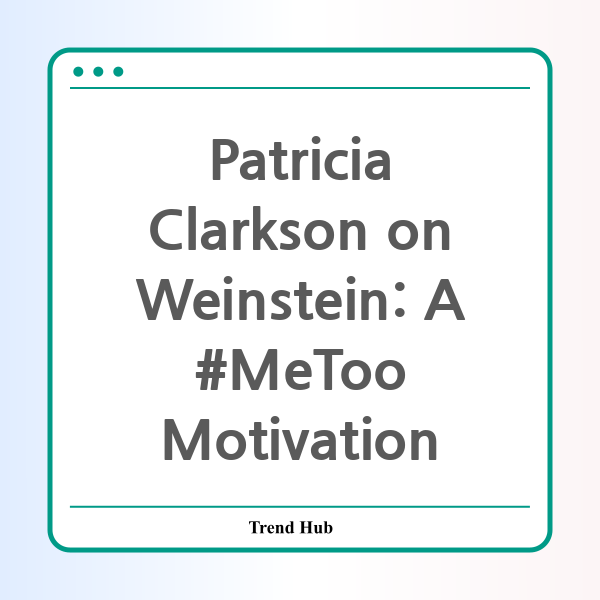* This website participates in the Amazon Affiliate Program and earns from qualifying purchases.

When it comes to Hollywood, it’s no secret that the environment has often been overwhelming, especially for women. Patricia Clarkson, a talented actress with a notable career, recently opened up about her harrowing encounter with Harvey Weinstein, which significantly influenced her decision to star in the impactful #MeToo film, "She Said." This revelation sheds light on the darker corners of the film industry and serves as a powerful narrative that resonates with many.
In an exclusive interview, Clarkson reflected on an incident from the early 2000s that still haunts her. During her Oscar campaign for "The Station Agent" in 2003, she faced pressure from Weinstein, who was then the head of Miramax Films. He attempted to persuade her to switch from the best lead actress category to the best supporting actress category—a move that could have been more advantageous for the studio but would undermine her recognized role as the lead in her film.
Clarkson fiercely opposed this categorization, stating, “I hate when actors put themselves in false categories.” Her principled stand against Weinstein's manipulation highlighted a broader issue within the Academy's award categories, emphasizing the need for transparency and fairness. "When you are supporting, you should truly be a supporting player, and when you're the lead, you have to step up and go into a harder category," she explained, adding, "I was the lead in 'Station Agent,' so I said, 'No, Harvey, I'm not going into supporting.'" This powerful stance exemplifies Clarkson's commitment to her craft and integrity.
However, taking this stand came at a cost. Weinstein's reaction to Clarkson's refusal was severe; he threatened her by saying she would "never work again." Clarkson admitted the situation escalated to a very ugly confrontation, showcasing the toxic power dynamics that existed in Hollywood at the time. Despite this threat, she remained resolute and ultimately earned an Oscar nomination for her role in "Pieces of April," a film where she willingly accepted a supporting role alongside Katie Holmes.
This fortitude in the face of intimidation from one of Hollywood’s most powerful men is commendable. Clarkson’s story doesn’t just reflect her tenacity; it delves into the systemic issues of manipulation and abuse within the film industry. Years later, this experience would come full circle, motivating her to join the cast of "She Said," a film that recounts the investigative journalists from The New York Times who uncovered Weinstein’s extensive history of sexual misconduct.
Clarkson noted that while her experience with Weinstein was a form of abuse, it paled in comparison to the horrific experiences endured by many other women in the industry. She articulated a deep awareness of the broader narrative of suffering and hardship that many women faced under Weinstein’s reign of terror. Clarkson expressed, "This was patter to me, what I went through with Harvey. It was still difficult and terrible what he did to me, but compared to so many women who went through so much more, it was odd to talk about it."
As conversations around power dynamics and sexual harassment continue to gain traction in Hollywood, Clarkson’s courage to share her story serves as a testament to the importance of solidarity among women. The film "She Said" not only commemorates the investigative work that brought Weinstein to justice but also represents a pivotal moment of awakening for many in the industry.
Clarkson’s involvement in "She Said" was not merely due to her past experiences; it was a decision rooted in a desire to shine a light on the pervasive issue of sexual misconduct within the film industry. "Of course it was a motivation to do 'She Said,'" she stated emphatically. With this declaration, Clarkson aligns herself with a movement that seeks to empower women and ensure that their voices are heard, respected, and valued.
In conclusion, Patricia Clarkson’s experience with Weinstein is more than just an individual story; it is part of a larger narrative regarding the fight against systemic abuse in Hollywood. Her journey from confrontation to empowerment exemplifies the courage needed to break free from the chains of intimidation. As the #MeToo movement continues to evolve, stories like Clarkson’s will remain pivotal in reminding us of the importance of standing firm in the face of adversity.
* This website participates in the Amazon Affiliate Program and earns from qualifying purchases.